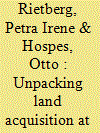| Srl | Item |
| 1 |
ID:
186465


|
|
|
|
|
| Summary/Abstract |
Local authorities in France have recently been granted administrative and operational responsibilities to pursue action in the domain of renewable energy. In this article we discuss the strategies and projects implemented by a diverse set of local authority groupings in France and highlight the different ways in which they have appropriated the issues and challenges of renewable energy. These intermunicipal entities have different sociocultural and geographic configurations, and our study shows that their local public action is driven by different motivations. Renewable energy is a vector for development that can be utilized in various ways, sometimes to legitimate public energy policy in the territory, and in other instances to bring in revenue. The politics of territorial energy strategy are often narrowly bounded by the scope of the intermunicipal structure (Etablissement public de coopération intercommunale, EPCI). This restricted focus makes it difficult to develop strategies spanning several territories, and in the long term could lead neighbouring territories to compete to attract investment.
|
|
|
|
|
|
|
|
|
|
|
|
|
|
|
|
| 2 |
ID:
189946


|
|
|
|
|
| Summary/Abstract |
Local governments are the bedrock for sound public administration because of their role in promoting bottom-up socio-economic development. Although Zimbabwe has made strides in ensuring citizens’ participation in local government processes, local authorities and other stakeholders still rely on the top-down approaches, marginalising the needs of the local citizens. The purpose of this paper is to determine the factors that affect the active participation of citizens in local governance in the Murewa District in Zimbabwe. Based on a multistage sampling approach, involving purposive sampling and stratified random sampling, interviews were conducted with 30 local government officials, while a questionnaire survey was administered to 396 citizens in four wards within the district. Complementary data were collected through focus group discussions and field observations. Thematic analysis was employed on data generated from interviews, focus group discussions and field observations, while the Statistical Package for the Social Sciences (Version 16) was used to analyse quantitative data from the questionnaire survey. The results show that more than 50% of the residents in the district felt that local government leadership side lined them in development planning. Some citizens reported that officials used development planning meetings to further their political agendas. The study recommends enhancement of citizen participation through citizen empowerment programmes such as educational and political leadership training programmes that transform the marginalised communities into autonomous communities that are capable of determining their own destiny.
|
|
|
|
|
|
|
|
|
|
|
|
|
|
|
|
| 3 |
ID:
163240


|
|
|
|
|
| Summary/Abstract |
Very few studies have captured the full complexity of land acquisition processes at the agricultural frontier. Specifically, the different stages in the land acquisition process and the changing responses of local communities to plantation development have not been adequately described and explained. Based on a detailed empirical case study of a land acquisition process in a village at the oil palm frontier in West Kalimantan, Indonesia, we address this knowledge gap. To comprehensively capture reactions ‘from below’ to large‐scale land acquisition, we use the interlinked concepts of access, property and authority. We show that the land acquisition process is basically a process of transforming and obscuring customary property rights and local authority. In our case, this process is characterised by an initial recognition of customary rights and local authority by the oil palm company. However, in the course of the process, these property rights and local authority are being transformed and eventually obscured. We call for a more interventionist state to prepare a less uneven playing field at the very beginning of land acquisition processes. This could slow down the nearly irrevocable obfuscation of customary rights and the erosion of local authority at the oil palm frontier.
|
|
|
|
|
|
|
|
|
|
|
|
|
|
|
|